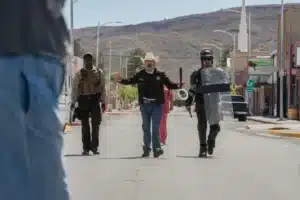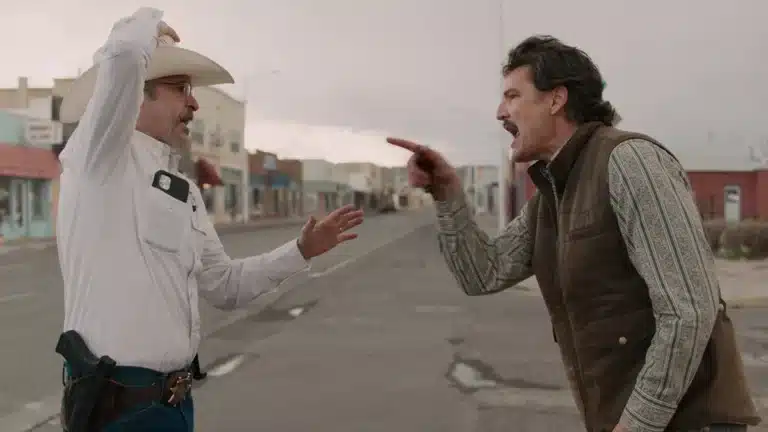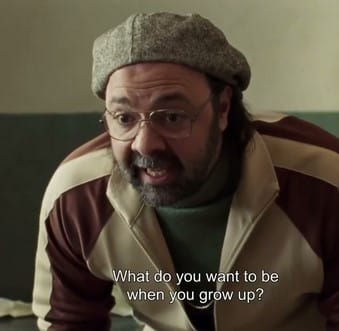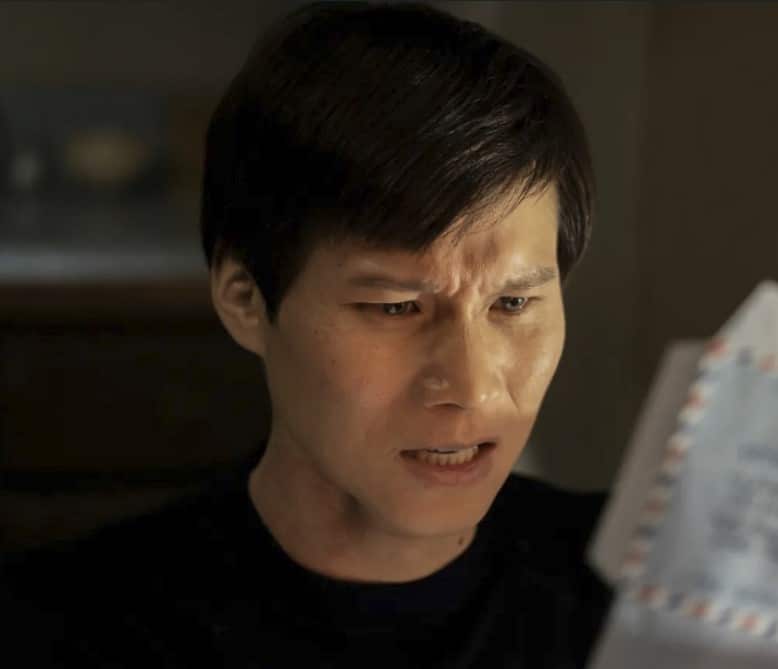Set in May 2020 in a fictional New Mexico town, Pedro Pascal and Joaquin Phoenix’s new film Eddington draws some parallels to two of the biggest breakout shows of the past decade: The Last of Us and The Walking Dead. It’s a story about a virus that’s less about death and more about exposing the living.
But the virus in Eddington is COVID-19, and the pandemic panic is something every one of us actually experienced.
Eddington’s central tension revolves around a growing standoff between Sheriff Joe Cross (Phoenix), a man clinging to order, and Mayor Ted Garcia (Pascal), who is trying to hold the town together. What begins as a debate over masks and mandates quickly unravels into something darker: a boiling mix of paranoia, racial strife, political resentment, and displaced rage.
It’s only been five years, and we are still living through the wake of COVID. So Eddington might hit a little too close to home for some. For others, it can be a film that helps make sense of open wounds. The chaos unfolding on screen mirrors real-life breakdowns, forcing us to reckon with how quickly civility gives way to suspicion, and how much ugliness we let slide under the weight of fear.
A Pandemic Pressure Cooker
From the first frame, writer and director Ari Aster sets the tone. Best known for the acclaimed horror films like Midsommar (2019) and Hereditary (2018), Aster opens Eddington with a rambling, coughing homeless man who mutters to himself just as a tense encounter unfolds between the sheriff and border patrol; they are arguing over mask mandates.

Then come the media clips: death tolls, policy clashes, mask debates. What starts as a conversation quickly escalates into a confrontation among the townspeople.
Slowly, and then suddenly, we see how the fear creeps in through social media, town halls, and the echo chambers of folks who swear they’re just “protecting their freedoms.” You’ve seen this before, right? It’s a claustrophobic world where science is questioned, rules are resented, and neighbors start to look like ideological threats. Aster captures how COVID didn’t just divide us because of the illness, it exposed everything lurking beneath the surface.
Freedom as a Weapon
Sheriff Joe doesn’t just hate government regulation; he resents Mayor Garcia’s very existence. He’s the kind of guy who calls mask mandates tyranny, blaming them for why he “can’t breathe,” even as scenes throughout the film show his home stocked with cough medicine and asthma inhalers. But Aster doesn’t turn him into a caricature. What makes Joe dangerous is how relatable he appears to be. We’ve seen versions of him before on social media, at school board meetings, even sitting across the dinner table.

What Eddington gets right is how the language of personal freedom became a kind of political cosplay. Here, “choice” becomes confrontation. Refusing a mask is no longer a personal decision—it’s an act of rebellion. The film draws a clear line between self-interest and so-called “liberty,” and how easily the two are confused when fear and ego take the wheel.
The Rage Beneath the Surface
Just like the COVID lockdowns forced us to sit with the harsh reality of racial injustice and police brutality, Eddington uses its small-town setting to reflect on the kind of simmering tension that boiled over in 2020. Through viral videos and round-the-clock news coverage, the world had no choice but to face its stark injustices, like the murder of George Floyd, which sparked global protests and forced uncomfortable conversations in homes, schools, and government buildings alike.
In Eddington, it’s a group of young people who embody this generational shift. There’s Sarah (Amélie Hoeferle), a social justice influencer driven by, yes, white guilt, but also a real desire to support marginalized voices during the height of the Black Lives Matter movement. There’s also the mayor’s son Eric (Matt Gomez Hidaka), whose motivation feels more self-serving than rooted in justice. And then there’s Brian (Cameron Mann), a teen who seems more interested in joining Black Lives Matter to impress Sarah than to fight for the cause.

Although their town feels isolated, their actions still carry weight. Sheriff Joe’s department reveals just how unprepared and untrained small-town law enforcement can be in times of escalating conflict and protests. His deputy, Guy (Luke Grimes), shows up in full riot gear, eager to flex authority. Meanwhile, Michael (Michael Ward), one of the few Black residents and a fellow deputy, opts for a less aggressive presence and tries to de-escalate. His loyalty is questioned by both sides, but his approach speaks volumes. The contrast between the two men isn’t just visual; it reflects how differently they interpret their role in law enforcement and the community they’re supposed to serve.
The Seduction of Misinformation
Emma Stone plays a smaller part here as Louise Cook, Sheriff Joe’s wife who becomes one of the many swept up in conspiracy theories. She has a complicated past with Garcia, and it ties them together in ways neither of them can shake. For Joe, this makes everything more personal. But Joe also mirrors what we saw in real life: local leaders battling not just a virus, but their egos and reputations.
She has a complicated past with Garcia, and it ties them together in ways neither of them can shake. For Joe, this makes everything more personal. But Joe also mirrors what we saw in real life: local leaders battling not just a virus, but their egos and reputations.
Through Stone, we get a glimpse of how easily people can be seduced by the illusion of power when they feel ignored or left behind. That pull is intensified by Vernon (Austin Butler), a charismatic cult leader whose presence is both alluring and dangerous. Their connection is sparked by Louise’s mother, Dawn (Deirdre O’Connell), the town’s eccentric conspiracy theorist who might seem wild-eyed at first, but represents a very real subset of American life.
Aster’s Most Cryptic Film Yet
Eddington is visually striking and often arresting, but it’s also disjointed. There’s no single thread to hold onto, just spiraling tension, scattered allegiances, and abrupt violence. That might be the point. It seems as if Aster doesn’t want to offer answers. He wants to reflect our own confusion back at us. The pandemic didn’t come with a clear moral, and neither does this film.
But here’s the challenge: confusion isn’t always compelling. At times, Eddington feels so committed to ambiguity that it loses emotional weight. You admire the craft, but struggle to take an interest in it. There’s a difference between unresolved and unfinished, and the film often flirts with the latter.
The Takeaway: Reflection Without Resolution
There’s no doubt Eddington is timely and ambitious. It’s one of Aster’s most politically provocative films, tackling public health, technology, conspiracy, and the unraveling of our social fabric all in one two and a half hours. And it captures the feeling of living through COVID-19 claustrophobia, outrage, and disillusionment. But it doesn’t necessarily say something new about it.
Sheriff Joe and Mayor Garcia are compelling characters in this world unraveling, but they’re also stand-ins for a larger story that never quite settles.
Still, Eddington does pull off something rare: it makes our recent past worth revisiting. Not to rehash the trauma, but to remind us just how close we came to losing it and how some towns still haven’t found their way back.









Start a watercooler conversation: